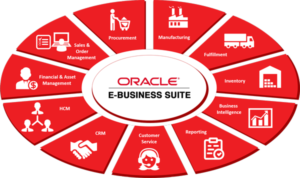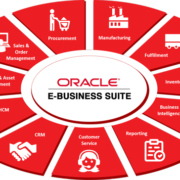Many on-prem ERP and CRM packages are not sufficiently secured
 When was the last time most organizations discussed the security of their Oracle E-Business Suite? How about SAP S/4HANA? Microsoft Dynamics? IBM’s DB2? Discussions about on-prem server software security too often begin and end with ensuring that operating systems are at the latest level, and are current with patches.
When was the last time most organizations discussed the security of their Oracle E-Business Suite? How about SAP S/4HANA? Microsoft Dynamics? IBM’s DB2? Discussions about on-prem server software security too often begin and end with ensuring that operating systems are at the latest level, and are current with patches.
That’s not good enough. Just as clicking on a phishing email or opening a malicious document in Microsoft Word can corrupt a desktop, so too server applications can be vulnerable. When those server applications are involved with customer records, billing systems, inventory, transactions, financials, or human resources, a hack into ERP or CRM systems can threaten an entire organization. Worse, if that hack leveraged stolen credentials, the business may never realize that competitors or criminals are stealing its data, and potentially even corrupting its records.
A new study from the Ponemon Institute points to the potential severity of the problem. Sixty percent of the respondents to the “Cybersecurity Risks to Oracle E-Business Suite” say that information theft, modification of data and disruption of business processes on their company’s Oracle E-Business Suite applications would be catastrophic. While 70% respondents said a material security or data breach due to insecure Oracle E-Business Suite applications is likely, 67% of respondents believe their top executives are not aware of this risk. (The research was sponsored by Onapsis, which sells security solutions for ERP suites, so apply a little sodium chloride to your interpretation of the study’s results.)
The audience of this study was of businesses that rely upon Oracle E-Business Suite. About 24% of respondents said that it was the most critical application they ran, and altogether, 93% said it was one of the top 10 critical applications. Bearing in mind that large businesses run thousands of server applications, that’s saying something.
Yet more than half of respondents – 53% — said that it was Oracle’s responsibility to ensure that its applications and platforms are safe and secure. Unless they’ve contracted with Oracle to manage their on-prem applications, and to proactively apply patches and fixes, well, they are delusional.
Another area of delusion: That software must be connected to the Internet to pose a risk. In this study, 52% of respondents agree or strongly agree that “Oracle E-Business applications that are not connected to the Internet are not a security threat.” They’ve never heard of insider threats? Credentials theft? Penetrations of enterprise networks?
What About Non-Oracle Packages?
This Ponemon/Onapsis study represents only one data point. It does not adequately discuss the role of vendors in this space, including ERP/CRM value-added resellers, consultants and MSSPs (managed security service providers). It also doesn’t differentiate between Oracle instances running on-prem compared to the Oracle ERP Cloud – where Oracle does manage all the security.
Surprising, packaged software isn’t talked about very often. Given the amount of chatter at most security conferences, bulletin boards, and the like, packaged applications like these on-prem ERP or CRM suites are rarely a factor in conversations about security. Instead, everyone is seemingly focused on the endpoint, firewalls, and operating systems. Sometimes we’ll see discussions of the various tiers in an n-tier architecture, such as databases, application servers, and presentation systems (like web servers or mobile app back ends).
Another company that offers ERP security, ERPScan, conducted a study with Crowd Research Partners focused on SAP. The “ERP Cybersecurity Study 2017” said that (and I quote from the report on these bullet points):
- 89% of respondents expect that the number of cyber-attacks against ERP systems will grow in next 12 months.
- An average cost of a security breach in SAP is estimated at $5m with fraud considered as the costliest risk. A third of organizations assesses the damage of fraudulent actions at more than 10m USD.
- There is a lack of awareness towards ERP Security, worryingly, even among people who are engaged in ERP Security. One-third of them haven’t even heard about any SAP Security incident. Only 4% know about the episode with the direst consequences – USIS data breach started with an SAP vulnerability, which resulted in the company’s bankruptcy.
- One of three respondents hasn’t taken any ERP Security initiative yet and is going to do so this year.
- Cybersecurity professionals are most concerned about protecting customer data (72%), employee data (66%), and emails (54%). Due to this information being stored in different SAP systems (e.g. ERP, HR, or others), they are one of the most important assets to protect.
- It is still unclear who is in charge of ERP Security: 43% of responders suppose that CIO takes responsibilities, while 28% consider it CISO’s duty.
Of course, we still must secure our operating systems, network perimeters, endpoints, mobile applications, WiFi networks, and so-on. Let’s not forget, however, the crucial applications our organizations depend upon. Breaches into those systems could be invisible – and ruinous to any business.



